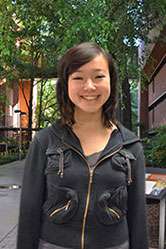Major: Physics
“Study of the Energy Density Ratio of Galaxy Lobes through Simulation of Radio Galaxy Populations”

Astronomers usually assume that the magnetic field and relativistic electrons in the lobes of powerful radio galaxies observed by radio telescopes are in energy equipartition. However, there is no physical argument to support or refute this distribution and no observational test that can be applied to an individual radio galaxy to evaluate it. Therefore, we will create simulated radio galaxy populations with physically plausible distributions of electron and magnetic field densities using Monte-Carlo techniques and use them to find how close the sources are to equipartition for a radio telescope of a given sensitivity. The goal of this research will be to determine under what conditions the assumption of equipartition holds. Evaluating this assumption will allow the energy content of the radio lobes to be more accurately constrained in the studies of evolution of galaxies and galaxy clusters.
How did you find your mentor for your research project?
One of my physics professors, Dr. McCann, knew that I was looking for a research opportunity and told me that Dr. Georganopoulos was looking for a student to work on a project with. The Physics department is a great place to look for research because it’s relatively small. The professors get to work very closely with you, which is great!
How did you know this was the project you wanted to do?
I was really excited about this project because it gives me a chance to strengthen my programming skills and because I actually didn’t have very much knowledge about astrophysics before working with Dr. Georganopoulos, so I’ve learned a lot through my research.
Is this your first independent research project?
Yes, I’ve worked in a lab before, but never had an independent project.
Do you get course credit for this work?
Yes, my research is on my transcript as an upper-level Physics elective.
How much time do you put into it?
Since my research is not in a lab, I get to work on my own schedule, which is really convenient! The amount of time varies depending on the week, but I spend somewhere in the range of 5 to15 hours working on the project in a week.
How did you hear about the Undergraduate Research Award (URA) program?
My mentor has applied for URA’s in the past with students he worked with, so he told me about the program and his experiences with it.
What academic background did you have before you applied for the URA?
I was a junior physics major with no research experience since high school.
Was the application difficult to do?
The application was pretty straightforward, but it was difficult to write in depth about a project that I was just beginning to learn about.
How much did your mentor help you with the application?
My mentor was a huge help with the application because he had a much more in-depth knowledge of the project and had written applications for URA’s in the past.
What has been the hardest part about your research?
The hardest part so far has been working through programming issues because although I have experience in Mathematica, my research often requires me to go beyond what I learned in computational physics. Because of this, I’ve had to expand my knowledge of the language and sort out many error messages!
What was the most unexpected thing?
The most unexpected thing for me so far has been how closely my mentor has been working with me. He worked with me on building up my basic knowledge on the subject and gave me a lot of guidance and direction at first to help me transition into doing independent work on the project.
How does your research relate to your work in other classes?
I am currently taking an astrophysics class, so my project allows me to take a much closer look at galaxies and how radiation of the lobes occurs. Another interesting thing that I can take away from my research is how much of physics is based on assumptions and simplifications because my project is examining the accuracy of an assumption that astrophysicists usually utilize.
What else are you involved in on campus?
I am a TA for cell biology, a peer health educator, and a member of the Stilettos (UMBC’s all-female a capella group). I also set up labs for Physics 111, 112, and 122L.
What is your advice to other students about getting involved in research?
Ask your professors about opportunities in research because they can connect you to a potential mentor much more efficiently than just sending out many emails can!
What are your career goals?
I plan to earn a Ph.D. in biophysics and eventually go to medical school. I’m not sure yet what field of medicine I would like to enter.
10/10/2014